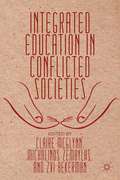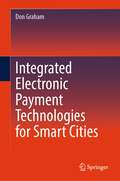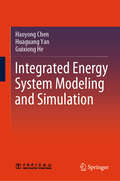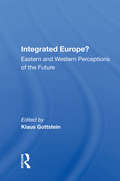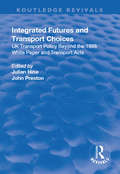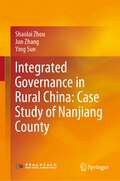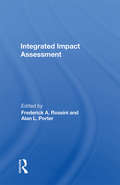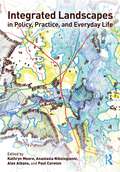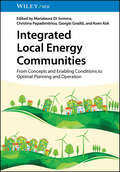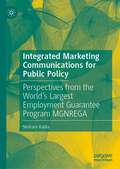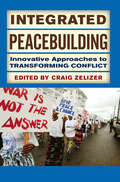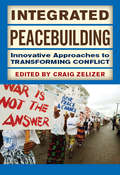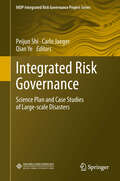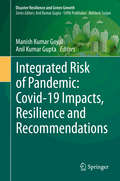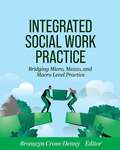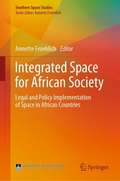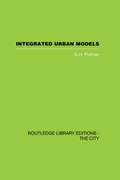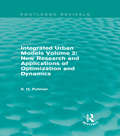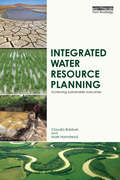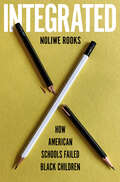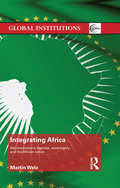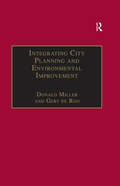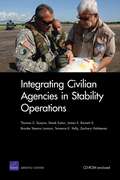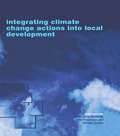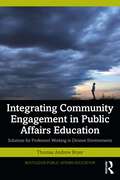- Table View
- List View
Integrated Education In Conflicted Societies
by Michalinos Zembylas Zvi Bekerman Claire McglynnAcademics and practitioners examine the developing field of integrated education in conflicted societies, where children who would normally be educated apart are deliberately educated together. They draw on a range of theoretical and practical frameworks, providing numerous case studies from Northern Ireland, Israel, Macedonia, and Cyprus.
Integrated Electronic Payment Technologies for Smart Cities
by Don GrahamThis book addresses the use of existing and emerging electronic payment technologies within a smart city in the context of the clear and proven value these systems have demonstrated in improving transportation. It addresses such question as How does the toll gantry work? How does it read the transponder tag and deduct the correct amount? How do cities harness the transaction data from mass transit to better meet the demand during peak hours? What can city planners do to make trip scheduling and payments seamless, so commuters can go from park-and-ride to mass transit to ride-share with a single payment platform? The volume is technical in nature and describes solid technical solutions to engineers and planners associated with smart cities initiatives. It is specifically designed to support smart city designers and engineers as they develop strategies that incorporate the latest payment system technologies. It will also be of value to private sector payment systems solution providers looking to deliver their products and services to smart cities. In addition, the book supplements technical perspectives with guidance on planning and implementation. For example, it defines procurement approaches for emerging technologies such as crypto currencies and block chain. Rounding out technical detail with advice on policy and the organizational framework required to underpin the technologies, the book delivers practical support to smart city technical practitioners. It further stands as an appropriate text for university courses associated with smart city planning, operations, and urban analytics. This book explores these questions and provides answers that a typical transportation planner can follow. It covers technology topics such as RFID (Radio Frequency ID), ETC (Electronic Toll collection), and ANPR (Automatic Number Plate Recognition). The book also delves into how contactless payment (Near-Field) technologies can be used in a smart city. Blockchain is introduced as a platform that is suitable for solving the problem of payment segregation and shows how the entities in a smart city can work together to provide a seamless payment solution for riders across different modes of transport. The book also covers some theoretical concepts of congestion pricing which students at the university level can apply to city planning projects and research into smart cities. Several examples of US-based and international smart city implementations are provided in the closing chapters which demonstrate new, innovative smart city techniques for the transportation planner.
Integrated Energy System Modeling and Simulation
by Haoyong Chen Huaguang Yan Guixiong HeThis book provides an in-depth introduction to the dynamic characteristics of Integrated Energy Systems (IES). It establishes a unified energy network model, elucidating the complementarities between various forms of energy, the conversion efficiencies, and the interactions and influences on operating costs. The book proposes methods for the planning, configuration, and operational control of IES and develops a simulation system for the integration of multi-physical field analog, hybrid transient, and steady-state conditions. The established mathematical models and simulation system are utilized to conduct a series of analyses under typical integrated energy scenarios. These analyses evaluate the operational performance and economic benefits of IES across different conditions. This book serves as a valuable resource for professionals involved in the research, planning, design, consulting, research and development, and operation of businesses related to integrated energy systems. It also serves as an essential reference for educators and college students.
Integrated Europe?: Eastern And Western Perceptions Of The Future
by Klaus GottsteinThis volume contains information on the views held in various countries concerning what the future holds and what should be done, by each nation's own government as well as by the governments of the partner nations.
Integrated Futures and Transport Choices: UK Transport Policy Beyond the 1998 White Paper and Transport Acts
by JULIAN HINE AND JOHN PRESTONThis title was first published in 2003. The UK transport White Paper "A New Deal for Transport" and new Transport Acts for England, Wales and Scotland have indicated and defined the future direction and policy agenda of national governments. The need for integrated transport raises key policy issues, among which are: the importance of sustainability; and the integration of transport policy with other areas of public policy, such as social exclusion and health. The idea of this direction in policy has implications for the changing nature of work, traveller information, interchange and public transport, freight distribution and the use of new technology. This volume also examines key areas of policy and regulation, which are developing as a result of the White Paper and the new Transport Acts. The volume brings together leading UK academics in the field of transport studies to discuss and reflect on these issues, and the state of transport policy in the UK within this new and developing policy framework.
Integrated Governance in Rural China: Case Study of Nanjiang County
by Jun Zhang Ying Sun Shaolai ZhouThis book adopts the methods of field investigation and case study, systematically summarizes the development course of Nanjiang County in Sichuan Province since China’s reform and opening-up, and comprehensively sorts out its main experiences of promoting green development and rural governance. These experiences not only have great enlightening and demonstration significance to the 80 counties that belong to the Qinba mountain area, but also have important reference value to promote rural revitalization and realize effective governance in the vast mountainous areas and counties throughout the country. Therefore, this book is not only suitable for ordinary readers interested in China's reform and opening up, but also suitable for professional researchers interested in China's green development and rural governance.
Integrated Impact Assessment
by Frederick RossiniAn outgrowth of the recognition that the varieties of impact assessment have much in common and that the common elements are a sound basis for an intellectual framework, this book incorporates contributions from leading practitioners of technology, environmental, and social impact assessment. The authors describe integrated impact assessment; addre
Integrated Landscapes in Policy, Practice and Everyday Life
by Kathryn Moore Paul Cureton Anastasia Nikologianni Alex AlbansExploring the ways in which an integrated landscape vision can help deliver regional, national, and international agendas, this book investigates how a new idea of landscape can reimagine governance, policy, economics, culture, identity, health, transport, and development priorities by connecting in a more powerful and meaningful way with local aspirations and demands. Developed in fieldwork undertaken over the last decade, the capacity of a landscape-led approach to deal with problems such as rapid urbanisation, water and food security, climate change, air pollution, and health is both timely and topical. Divided into three main sections, it includes illustrated case studies from the UK, Europe, East Asia, South Asia, and more. As part of a strategy to capture, build, and disseminate expertise in this approach, the book aims to develop an interdisciplinary body of work that will appeal to academics and professionals, by bringing together a number of contributors who are operating at the cutting edge of landscape-led large-scale transformation. This book is essential for practitioners and academics of landscape architecture, as well as students in the architecture and design fields.
Integrated Local Energy Communities: From Concepts and Enabling Conditions to Optimal Planning and Operation
by Marialaura Di SommaIntroducing a framework for obtaining and maintaining renewable energy security at the local community level Local energy communities are a framework for assembling and coordinating major stakeholders, individual, corporate, and institutional, in the pursuit of long-term renewable energy and carbon-free projects in a given area. They are aimed at community benefits rather than profit, and have become an invaluable tool in the fight to reimagine the global energy grid, one community at a time. With climate change making this fight ever more urgent, integrated local energy communities (ILECs) that enhance the previous concept through a multi-carrier systems’ approach have never been a more important social force. Integrated Local Energy Communities offers a framework for designing, planning, and operating communities from end to end. Incorporating regulatory and policy issues, the mechanics of local multi-carrier energy systems, social aspects and more, it provides viable solutions to one of the most urgent energy challenges of our time. The result is an indispensable contribution to a potentially transformative process. Integrated Local Energy Communities readers will also find: Comprehensive coverage of all types of energy conversion technologies and processesAnalysis of the entire value chain, from concepts to planning and operationDiscussion of all key factors for integrating the ILEC energy paradigm Integrated Local Energy Communities is ideal for energy engineers, electrical engineers, mechanical engineers, engineering scientists working in consultancy and industry, as well as the libraries that serve them.
Integrated Marketing Communications for Public Policy: Perspectives from the World’s Largest Employment Guarantee Program MGNREGA
by Shriram KadiaThis book is based on detailed empirical research conducted to analyse the communication dissemination approach applied to the world’s largest employment guarantee program MGNREGA (Mahatma Gandhi National Rural Employment Guarantee Act). To uncover the insights, perspectives and understanding of the program, more than 30 villages in Western parts of India were visited and more than 400 MGNREGA beneficiaries were contacted personally by the author. The book connects the two concepts of Integrated Marketing Communications (IMC) and Public Policy and highlights the importance of using the IMC tools for a meaningful and comprehensible communication dissemination strategies and campaigns. A global overview of public policy dissemination approaches adopted by federal governments in Brazil, Niger, Philippines, Indonesia, Pakistan, Bangladesh, South Africa, and Kenya have been presented to sensitize the readers with the communication dissemination strategies used at the global level. The book presents and discusses a conceptual framework for the ideal public policy communication initiatives and highlights the apt communications vehicles for the illiterate, vulnerable and marginalized beneficiaries.
Integrated Peacebuilding
by Craig ZelizerIntegrated Peacebuilding addresses the importance of weaving peacebuilding methods into diverse sectors including development, humanitarian assistance, gender, business, media, health, and the environment--areas where such work is needed the most. Incorporating peacebuilding approaches in these fields is critical for transforming today's protracted conflicts into tomorrow's sustainable peace. Covering both theory and practice, Dr. Zelizer and his team of leading academics and practitioners present original essays discussing the infrastructure of the peacebuilding field--outlining key actors, donors, and underlying motivations--as well as the ethical dilemmas created by modern conflict. Exploring both the challenges and lessons to be found in this emerging field, Integrated Peacebuilding is perfect for courses on peacebuilding, conflict resolution, international development, and related fields.
Integrated Peacebuilding: Innovative Approaches to Transforming Conflict
by Craig ZelizerIntegrated Peacebuilding addresses the importance of weaving peacebuilding methods into diverse sectors including development, humanitarian assistance, gender, business, media, health, and the environment?areas where such work is needed the most. Incorporating peacebuilding approaches in these fields is critical for transforming today's protracted conflicts into tomorrow's sustainable peace. Covering both theory and practice, Dr. Zelizer and his team of leading academics and practitioners present original essays discussing the infrastructure of the peacebuilding field?outlining key actors, donors, and underlying motivations?as well as the ethical dilemmas created by modern conflict. Exploring both the challenges and lessons to be found in this emerging field, Integrated Peacebuilding is perfect for courses on peacebuilding, conflict resolution, international development, and related fields.
Integrated Risk Governance
by Qian Ye Peijun Shi Carlo Jaeger"Integrated Risk Governance: Science Plan and Case Studies of Large-scale Disasters" is the first book in the IHDP-Integrated Risk Governance Project Series. It consists of two parts: Part I: Integrated Risk Governance Project Science Plan, which outlines the challenge, research programme, outcomes, and implementation strategy of the IRG Project; and Part II: Case Studies of Large-scale Disasters, which includes case analyses of experience, lessons learned and recommendations on various large-scale disasters around the world, such as the Tangshan and Wenchuan earthquakes and the great ice storm in China, European heat waves, and Hurricane Katrina in the USA. The community model of integrated natural disaster risk governance and paradigm of catastrophe risk governance in China are also presented. Prof. Peijun Shi works at Beijing Normal University, China; Prof. Carlo Jaeger works at Potsdam Institute for Climate Impact Research, Germany; Prof.Qian Ye works at Beijing Normal University, China.
Integrated Risk of Pandemic: Covid-19 Impacts, Resilience and Recommendations (Disaster Resilience and Green Growth)
by Anil Kumar Gupta Manish Kumar GoyalIn light of the novel corona virus outbreak in December 2019 and its subsequent impact on entire world as a global pandemic, the book attempts to provide integrated risk assessment on Covid -19 like pandemics, as well as to understand the societal, environment and economic impact of the outbreak in various sectors of development. It covers fundamental factors of global disease outbreaks and its coverage as major disaster through the complexity and severity of consequences, illustrating the dimensions of low frequency high intensity disasters. It brings together broad range of topics including basic concepts, isolation measure, role of governance and key technical advancements for containing the diseases. In addition, it also covers resilience analysis towards the impacts such outbreaks have on bio-diversity, ecosystem services and agricultural food production. It defines key exit strategies from the lessons learned and success stories of historical disease outbreaks. The book is presented in four parts, where part 1 familiarizes with fundamentals; part 2 focuses on integrated risk assessments; part 3 focuses on various measures and strategies of resilience; and part 4 suggests key lessons and recommendations. The book is a useful reading reference for scientific community, policy makers and professionals across the domains of health, environment, disasters and sustainable development. Book is specifically beneficial for postgraduate students, researchers, planners and field professionals.
Integrated Social Work Practice: Bridging Micro, Mezzo, and Macro Level Practice
by Bronwyn Cross-DennyFeaturing contributed chapters written by a variety of experts in the field, Integrated Social Work Practice: Bridging Micro, Mezzo, and Macro Level Practice presents vital and contemporary concepts within the discipline as an integrated whole, valuing and examining each topic at the micro through macro level. Section I introduces students to integrated practice, providing a brief history of social work and examining client systems at the micro, mezzo, and macro levels. Section II focuses on the signature pedagogy of fieldwork and includes interprofessional collaboration, and self-care and wellbeing. In Section III, students explore the social work process-from engagement through termination-at all practice levels. Section IV focuses on social justice, including diversity, equity, and inclusion; anti-racism and multicultural competency; intersectionality; practice with aging and LGBTQ+ populations; and human rights. Students focus on topics related to global engagement in Section V. The final section encourages evaluation, self-reflection, and lifelong learning. Individual and group exercises, practice integration examples, In the Field features, and student narratives support the overall learning experience. Presenting students with a cutting-edge approach aligned with building key competencies, Integrated Social Work Practice is an invaluable textbook for B.S.W. and M.S.W. programs and courses.
Integrated Space for African Society: Legal and Policy Implementation of Space in African Countries (Southern Space Studies)
by Annette FroehlichThis book provides an overview of the space sector in African countries, from a legal and policy point of view, analysing how the African Union's Space Policy and Strategy (ASPS) is implemented and highlighting the various space activities in each country. Against this backdrop, it investigates the ASPS, identifying its policy goals identified and discussing its strategy. Moreover, it explores the on-going regional cooperation programmes, the continent's leading space actors and their roles, and the space-related regional fora and organizations, reflecting on various initiatives, including the African Leadership Conference on Space Science and Technology for Sustainable Development (ALC), the Regional African Satellite Communications Organisation (RASCOM), and the African Resource Management Satellite Constellation (ARMS-C). As such, it is a valuable source of information on space capacities in African countries.
Integrated Urban Models Volume 1 (RLE: The City): New Research And Applications Of Optimization And Dynamics
by S. H. PutmanThis book was first published in 1983.
Integrated Urban Models Volume 2: New Research and Applications of Optimization and Dynamics (Routledge Revivals)
by Stephen H. PutmanFollowing on from Integrated Models Volume 1: Policy Analysis of Transportation and Lane Use (Routledge Library Editions, 2006), this book bridges the gap between the scholars and the practitioners of transportation and land-use modelling. First published in 1991, chapters discuss model-calibration and model-solution problems, describe a series of numerical and policy analyses, and propose potential directions for location and land-use research. This reissue will be of particular value to undergraduate and postgraduate geography students with an interest in integrated urban modelling; in particular, the research conducted in the field over the past two decades.
Integrated Water Resource Planning: Achieving Sustainable Outcomes
by Claudia Baldwin Mark HamsteadIntegrated Water Resource Planning provides practical, evidence-based guidance on water resource planning. In a time of heightened awareness of ecosystem needs, climate change, and increasing and conflicting demands on resources, water professionals and decision-makers around the world are on a steep learning curve. This book presents an international examination of water reform experiences, and provides lessons in how to manage environmental uncertainties, long term management, and increase in demand. It breaks the process down into a series of common steps, applies program logic and evaluation theory, and discusses best practices in assessment, decision making and community engagement. Importantly it recognises the large variation in available knowledge and capacity, risk and scale, and discusses a range of approaches that can be used for different circumstances. The book will fill in the gaps for professionals in interdisciplinary teams including sociologists, hydrologists, engineers, ecologists, and community consultation specialists, by providing a basic grounding in areas outside their usual expertise, and will provide ammunition to community stakeholders in their quest to ensure that water planning outcomes are justified and justifiable. Case studies provide an understanding of the context, practical tools and implementation techniques for achieving sustainable outcomes, and the multi-disciplinary approach and insights offered in this book will be transposable and instructive for water professionals worldwide.
Integrated: How American Schools Failed Black Children
by Noliwe RooksA powerful, incisive reckoning with the impacts of school desegregation that traces four generations of the author&’s family to show how the implementation of integration decimated Black school systems and did much of the Black community a disserviceOn May 17, 1954 the landmark case Brown v. Board of Education determined that racial segregation in schools was unconstitutional. Heralded as a massive victory for civil rights, the decision's goal was to give Black children equitable access to educational opportunities and clear a path to a better future. Yet in the years following the ruling, schools in predominantly Black neighborhoods were shuttered or saw their funding dwindle, Black educators were fired en masse, and Black children faced discrimination and violence from their white peers as they joined resource-rich schools that were ill-prepared for the influx of new students.Award-winning interdisciplinary scholar of education and Black history Noliwe Rooks weaves together sociological data and cultural history to challenge the idea that integration was a boon for Black children. She tells the story of her grandparents, who were among the thousands of Black teachers fired following the Brown decision; her father, who was traumatized by his experiences at an almost exclusively-white school; her own experiences moving from a flourishing, racially diverse school to an underserved inner-city one; and finally her son and his Black peers, who over half-century after Brown still struggle with hostility and prejudice from white teachers and students alike. She also shows how present-day discrimination lawsuits directly stem from the mistakes made during integration.At once assiduously researched and deeply engaging, Integrated tells the story of how education has remained both a tool for community progress and a seemingly inscrutable cultural puzzle. Rooks' deft hand turns the story of integration's past and future on it's head, and shows how we may better understand and support generations of students to come.
Integrating Africa: Decolonization's Legacies, Sovereignty and the African Union (Global Institutions)
by Martin WelzThe African Union (AU) is a continental organization that comprises every African state except for Morocco, is indeed a pioneering undertaking. Its ambitious aim is to integrate all member states, with the ultimate goal of forming the United States of Africa. Despite several attempts to build a union, the AU has remained an intergovernmental organization, one reason being a perceived unwillingness of the AU states to pool their national sovereignties. This study seeks to comprehend why Africa’s integration process has not moved towards a supranational organization, using a novel approach. It shifts the usual perspective away from the organization level and provides the first comprehensive and systematic analysis of the AU from the perspective of the states themselves. It includes 8 comprehensive case studies: Algeria, Burkina Faso, Ethiopia, Mauritius, South African, Swaziland, Uganda and Zimbabwe to help understand their foreign policy and provide key insights into why they are (un)willing to yield sovereignty. This work will be of great interest to students and scholars of African politics, international relations and international organizations.
Integrating City Planning and Environmental Improvement: Practicable Strategies for Sustainable Urban Development (Urban Planning and Environment)
by Gert de RooSince Integrating City Planning and Environmental Improvement was originally published in 1999, the practice of integrating urban physical planning and environmental quality management has been widely adopted by governments worldwide. Fully revised and updated with a new preface by editors Donald Miller and Gert de Roo and new figures throughout, this second edition reports on the experience of 23 innovative programmes from 11 countries. Mostly written by practicing planners and government officials, the book looks at a wide range of integrated approaches which have been implemented and the critical assessment of these provides lessons for local and national governments interested in setting up similar schemes and suggesting ways of further innovation. While the Rio Earth summit, Habitat II and Kyoto have been a source of global principles for improving the environmental quality of human settlements, this book explores approaches to implement these policy positions and to make these calls for action operational. Consequently, the presentation of these cases deals not only with the technical aspects of measuring and controlling environmental spillovers, but also with the institutional, political and financial aspects of these programmes.
Integrating Civilian Agencies in Stability Operations
by Terrence K. Kelly Derek Eaton Brooke Stearns Lawson Thomas S. Szayna James E. BarnettHow can the Army help make key civilian agencies more capable partners in stability, security, transition, and reconstruction (SSTR) operations? The authors identify the civilian agencies that should be involved in such operations, then locate the necessary skill sets. They then assess the capacity of the civilian agencies to participate in SSTR operations and analyze the recurring structural problems that have plagued their attempts to do so.
Integrating Climate Change Actions into Local Development
by John Robinson Livia Bizikova Stewart CohenTo date, climate change adaptation and mitigation have been treated separately both in research and in the climate negotiations. However, a growing body of literature is now being developed that points to actual and potential synergies and trade-offs between responses to climate change and sustainability. This literature has evolved in a spontaneous way with diverse approaches and no common methodology to help practitioners explicitly plan for these synergies. This special issue of the Climate Policy journal addresses this gap between scientific knowledge and practitioners' needs by focussing on linkages between climate change and sustainable development at the level of conceptual framework and methods. In particular, the papers address in an integrated way local development options involving both adaptation and mitigation in order to promote resilience to climate change in human and natural systems. The special issue provides policy and methodological guidelines for linking local deveopment pathways with responses to climate change, based on collaboration between local practitioners, the public and scientists.
Integrating Community Engagement in Public Affairs Education: Solutions for Professors Working in Divisive Environments (Routledge Public Affairs Education)
by Thomas Andrew BryerCommunity engaged universities prepare students to participate in societies in ways that are inclusive. This book presents a coherent argument for higher education institutions not only to encourage students to engage in their communities, but also to develop themselves as community engaged institutions. Analyzing the design and implementation of community engaged teaching and learning practices, author Thomas Bryer explores training in democratic practices and envisions a future in which higher education institutions are better prepared to cope with democratic backsliding.Teaching and professional development cases are woven throughout—developed, adapted, and enhanced by the author over a period of years—and grounded in the great debates happening today. Integrating Community Engagement in Public Affairs Education is a culmination of multiple years of experimentation with different approaches to teaching future and practicing public sector leaders the tools of democratic engagement. The text is grounded in a case‑based design that spans undergraduate, Master’s, and Ph.D. students, as well as local government managers, offering concrete examples of teaching and learning strategies that promote public value and measurable social impact. The book closes with practical strategies for publicly engaged scholars to effectively educate the next generation of students about democratic engagement within divided communities. It will be required reading for public administration faculty, as well as practicing public administrators and those who provide training to them.
